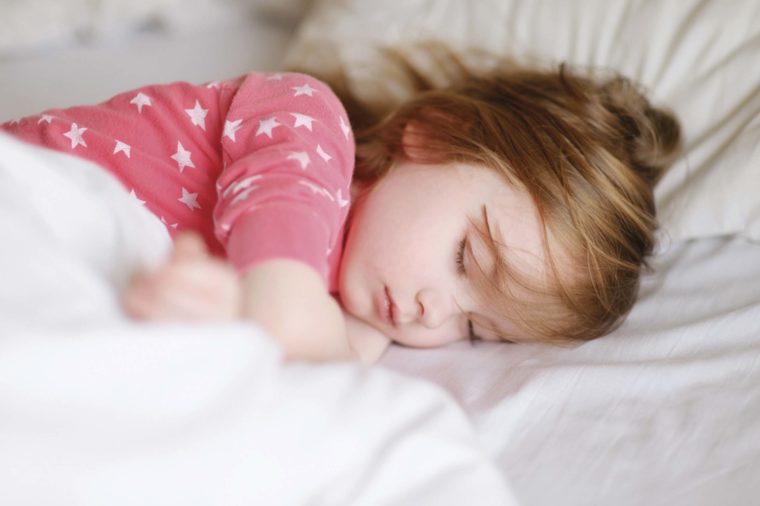The constant connectivity present in our smartphones may make life and communication easier, but as experts have long cautioned, our screens are a serious impediment to a good night’s sleep. In fact, using them before bed is one of the “harmless” habits that could give you insomnia. Now, new research is warning that this same habit is even more problematic for children and teens. Before you tuck your child in and turn out the lights, you’ll want to make sure that their smartphone is tucked away, too. Here’s more evidence that you should stop using your smartphone in bed.
According to the study conducted by researchers at the University of Colorado Boulder and published in the journal Pediatrics, children and teenagers are especially vulnerable to sleep disruption when using a smartphone before bed. The reason lies in a child’s development, as the brain, sleep patterns, and eyes are still developing in youths ages 5 to 17. Unlike adults, the eyes of children are not yet fully formed and their internal body clock is more sensitive to the impact of a glowing smartphone screen, Science Daily explains.
“Light is our brain clock’s primary timekeeper,” Monique LeBourgeois, an associate professor in the Department of Integrative Physiology at the University of Colorado Boulder told Science Daily. She explains that when light hits the retina in the eye in the evening hours, it suppresses the sleep-promoting hormone melatonin, delaying sleepiness and pushing back the timing of the body clock. “We know younger individuals have larger pupils, and their lenses are more transparent, so their exposure and sensitivity to that light is even greater than in older individuals.”
For their study, researchers gathered information from five previous studies that looked at the sleep patterns of children ages 5 to 17. Compiling the findings, researchers discovered that 90 percent of children experience a delay in falling asleep, fewer hours spent sleeping, and worse sleep quality when using a screen before bed. In one particular study, adults and children were exposed to a matching amount of light and light intensity. Following the exposure, children’s melatonin levels fell two times as much. Melatonin is a natural hormone created to help us sleep and is crucial in the sleep process; here’s everything you need to know before taking a melatonin supplement.
“Through the young eyes of a child, exposure to a bright blue screen in the hours before bedtime is the perfect storm for both sleep and circadian disruption,” LeBourgeois told Science Daily.
It doesn’t matter what activity your child is using their smartphone for either. Studies report that whether texting with friends or watching a video, the activity of using a smartphone boots cognitive arousal and is a form of psychological stimulation that will delay sleep.
Parents should be aware of where their child is keeping the screen, too. Researchers note that children who left a phone or computer on overnight in their room were more likely to report sleep disruption. Bedroom-based screens are of particular problem in adolescents, as more than 75 percent of youths report having a screen in their bedroom and 60 percent admit to using a screen before bed.
In order to help children sleep better at night, LeBourgeois suggests limiting a child’s media usage in the hour before bed, turning off all electronic media devices and charging them in a location outside the bedroom, and removing all electronic media from the bedroom of your adolescent. Most importantly, parents need to practice what they preach and turn their phones off before bed, too, experts said. These are the signs you may be addicted to your phone.












